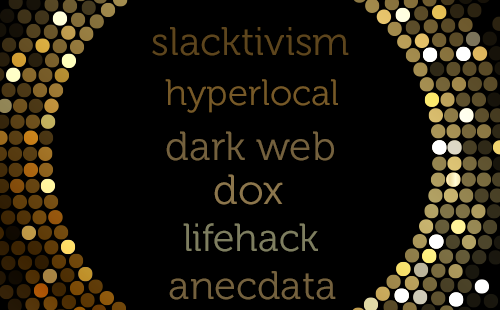In a spring 2015 update to the dictionary, we added more than a thousand new and modified definitions including gaming words like esports, permadeath and completionist, terms to prepare you for the 2016 elections like slacktivism, and gender-related terms agender, bigender, and gender-fluid.But how do lexicographers (the people who compile and update dictionaries) stay on top of language change? Luckily, we have a number of tools—both traditional and new—available to us. The oldest tool of all for dictionary writing is reading widely. From literature to scientific journals to new media outlets, these sources allow us to find and pinpoint both completely new words as well as words that are shifting in meaning and need new definitions.
We also look to our users—both directly in reviewing user suggestions and indirectly by analyzing words they look up that do not yet have definitions. In 2014, for example, our users were searching for microaggression and dox, but they weren’t finding any definitions. Dictionary.com’s primary purpose is to help people gain a deeper understanding of language. It’s important for us to listen to the data to make sure we’re answering our user’s questions, whether they’re about spelling, subtleties in meaning, or the definition of a new slang term.
From this big pool of potential additions, culled from reading and from users, how do we decide which words to add? Not all of these words make the cut. We rely on research in traditional publications, as well as technology like corpus research. In our case, we are currently using a corpus that has over 19 billion words. The corpus contains a massive collection of sources, from literature to news articles to television and interview transcripts, balanced to reflect actual usage of language. It also helps us write definitions and example sentences that reflect how a word is used: Is it always a noun? Or sometimes an adjective? What are the differences between dark web and deep web in terms of how experts discuss the terms?
This research enables us to add new words to the dictionary multiple times a year, so the next time you hear someone say form factor or haptics, Dictionary.com will help you understand.
Here’s a selection of words added in this update and their definitions:
agender: relating to a person who does not have a specific gender identity or recognizable gender expression.
basic: characterized by predictable or unoriginal style, interests, or behavior.
bigender: relating to a person who has two gender identities or some combination of both.
black hat: a hacker who violates the security of a system for personal profit or for the gratification of causing damage.
completionist: a player who attempts to complete every challenge and earn every achievement or trophy in a video game.
crash blossom: an ambiguously worded headline whose meaning can be interpreted in the wrong way, as “Missing Woman Remains Found.”
dark web: the portion of the Internet that is intentionally hidden from search engines, uses masked IP addresses, and is accessible only with a special web browser.
dox: to publish the private personal information of (another person) without the consent of that individual.
esports: competitive tournaments of video games.
gender-fluid: relating to a person whose gender identity or gender expression is not fixed and shifts over time or depending on the situation.
gesture: a particular movement of the fingers or hand over a screen, used to control or interact with a digital device.
haptics: the study or use of tactile sensations and the sense of touch as a method of interacting with computers and electronic devices.
hyperlocal: focused on a very small geographical community, as a neighborhood.
lifehack: a tip, trick, or efficient method for doing or managing a day-to-day task or activity.
microaggression: a subtle but offensive comment or action directed at a minority or other nondominant group that is often unintentional or unconsciously reinforces a stereotype.
permadeath: (in a game, often a video game) the permanent death of a defeated character, after which the player of the game cannot continue with the same character.
ship: to take an interest in a romantic relationship between fictional characters or famous people.
slacktivism: actions taken to bring about political or social change but requiring only minimal commitment, effort, or risk: students engaging in slacktivism by signing an online petition.
smartwatch: a computing device that resembles a wristwatch and is attached to a band worn around the wrist.














